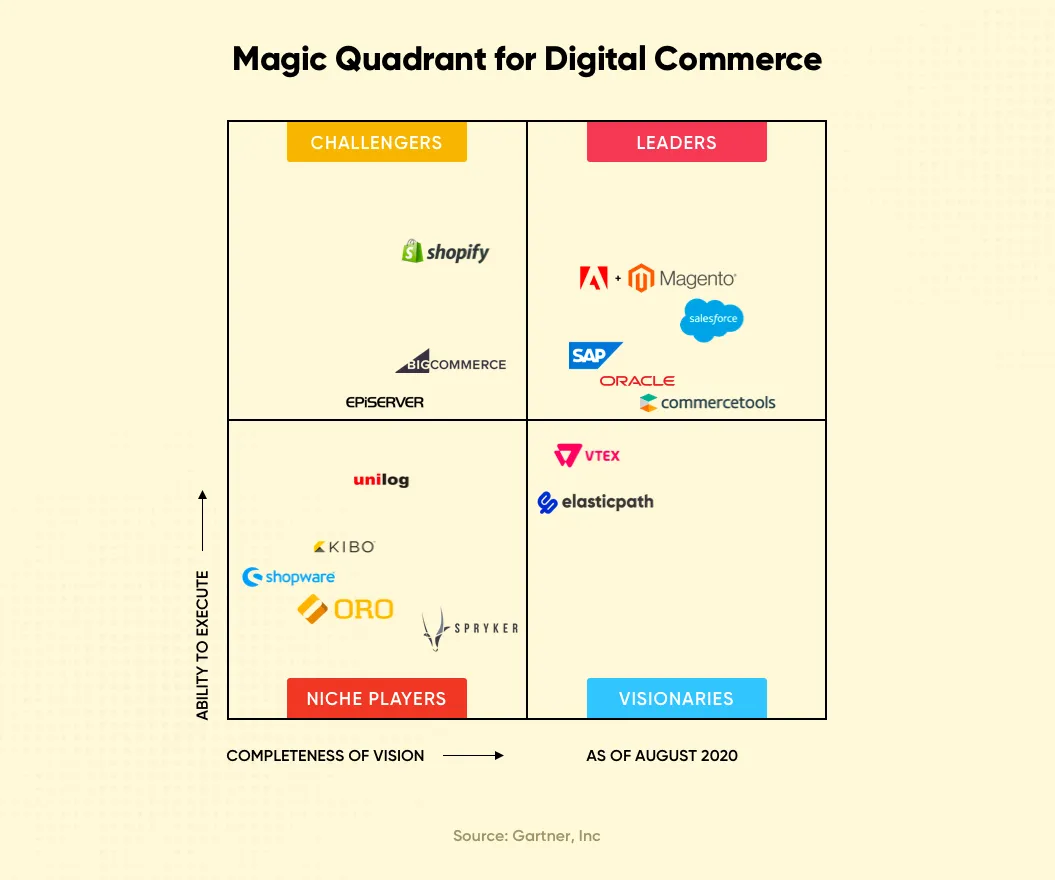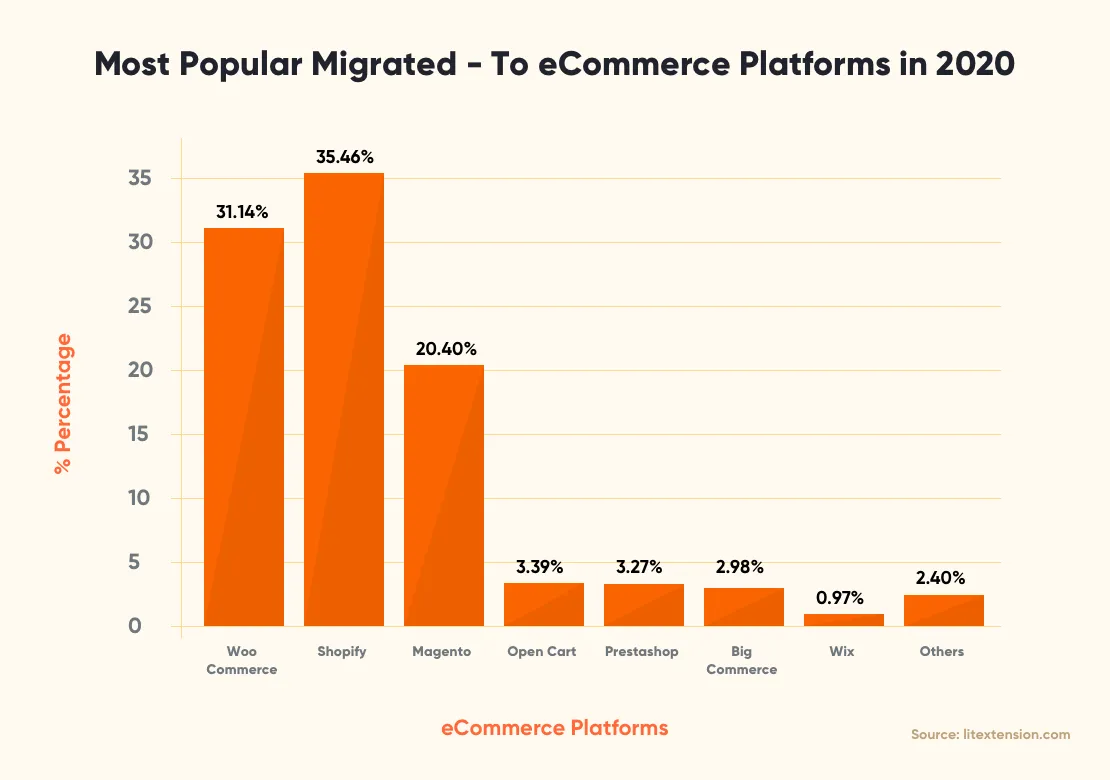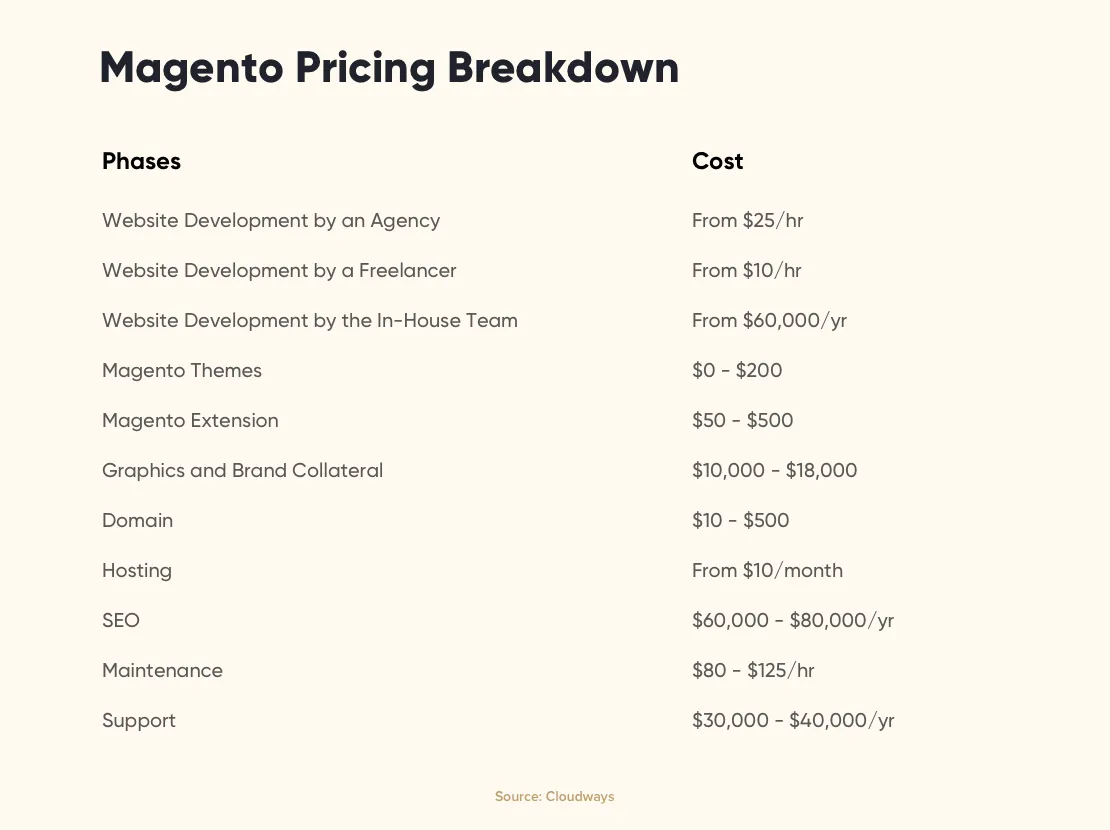An eCommerce platform is a foundation software that offers a medium to buy and sell products online. Choosing an eCommerce platform is the first step towards kick-starting an online business. There are many eCommerce platforms to choose from, but if the business would benefit from a flexible eCommerce platform that offers control over the look and functionality of the online store, Magento is the right choice.
Adobe Analytics data shows that, in March, overall eCommerce in the U.S. was up 25% At an aggregate level, we have seen site traffic for Magento Commerce merchants globally increase by an average of 30% during that same period.
- Magento
Also, according to the 2021 Gartner Magic Quadrant for digital commerce, Adobe (Magento) is positioned as an industry leader.

What is Magento?
Magento, developed by Varien Inc., a US private company, is an open-source digital commerce platform written in PHP. The software solution was first publicly released on March 31, 2008, and was later acquired by Adobe for $1.65 billion USD in 2018.
A CMS (Content Management System) platform is a “build it yourself” solution where the user gets the leverage to customize the platform’s look and functionality to offer a unique customer experience. Magento is hosted on-premise or through cloud hosting services such as AWS, Azure, or Google Cloud.
On average, merchants using Magento grow 3X faster than those on competitive platforms. They also realize a 50% reduction in Total Cost of Ownership.
- Magento
To set- up and maintain a Magento eCommerce store, a business needs to hire skilled developers to help them through the process. It would help to know how to hire a Magento developer too. This means that associated costs will be higher, however, it will help introduce the required level of customizations while offering access to many out-of-the-box features.
The code is made available universally and developers can make modifications to suit the business needs. Furthermore, to ease personalized implementations, Magento uses PHP frameworks such as Symphony and Laminas to provide code libraries for commonly used functions.
One of the characteristics that sets Magento apart is its extensive product management. Magento holds the capability to maintain over one million products, helping businesses expand their catalog with ease as they grow.
According to Litextension, Magento is one of the top three migrated-to platforms of 2020.

What is Magento 2?
Magento 2 is the latest operating version of Magento in the market, launched on November 17, 2015. Adobe ended support for its predecessor (i.e., Magento 1) on June 30, 2020. All platforms operating on Magento 1 were suggested to migrate to Magento 2 which offers newer technologies and more advanced functionalities to experiment with.
Magento 2 was introduced to fix the bugs and the gaps in the performance of Magento 1. The new version runs 25% faster and smoother than Magento 1.
The migration from Magento 1 to Magento 2 is a step-by-step process that the brands need to follow to enjoy the benefits that the latest version brings in. Brands such as Land Rover, Pino’s, and Tile Giant have successfully made the shift to avoid the vulnerabilities of the Magento 1.
According to BuiltWith, 165,530 websites are Magento 2 customers.
Some of the noteworthy benefits of shifting to Magento 2 include:
- Improved Performance and Scalability
- Enhanced Security
- Improved Checkout Process
- Advanced Reporting
- Mobile-friendly and responsive design

Magento: Service Levels
There are two service levels offered by Magento, including:
1. Magento Open Source
Magento Open Source is a self-hosted eCommerce platform that offers basic and essential features for free. This service level suits both small businesses with basic needs and large-scale eCommerce businesses looking forward to creating a prototype for testing innovative ideas.
2. Magento Commerce
On the other hand, Magento Commerce is an enterprise-level eCommerce platform that offers advanced features and functionalities. It is considered an all-in-one PaaS cloud solutions that enables customizations and third-party integrations.
This service level is suitable for B2B and B2C eCommerce businesses and supports selling across geographies while supporting multiple currencies. The latest version of Magento Commerce (i.e., Magento Commerce 2.4.2) was released in May of 2021.
For a comprehensive comparison between the two service levels, refer to this comparison guide by Magento.
As an add-on, Adobe introduced another service level in 2019, called the “Adobe Commerce Cloud.”
What is Adobe Commerce Cloud?
Adobe Commerce Cloud is a fully-managed cloud service model that is part of Magento. It offers the best digital commerce capabilities and Adobe tools integration (Analytics Cloud, Marketing Cloud, and Advertising Cloud).
In this new service model, Adobe will take care of the operational part of the eCommerce platform allowing the business owners the ability to focus on their core business entirely.
The best part about Adobe Commerce Cloud is its Amazon integration ability. The business will be able to cherry-pick the products they want to be displayed on the Amazon platform along with customized pricing.
What are the Top Magento Features?
Magento is popular for its diverse features and the ability to embed these features with customizations.
Here is a list of general features offered by Magento:
| Parameter | Noteworthy Features |
|---|---|
| 1. Search Engine Optimization |
|
| 2. Catalog Management |
|
| 3. Secure and Seamless Checkouts |
|
| 4. Order Management |
|
| 5. International Support |
|
| 6. Customer Service |
|
| 7. Analytics and Reporting |
|
| 8. Mobile Commerce |
|
| 9. Marketing and Promotion |
|
| 10. Site Management |
|
And, here’s a list of exclusive (out-of-the-box) features that Magento supports:
| Feature | Noteworthy Features |
|---|---|
| 1. Customer Segmentation |
|
| 2. Private Sales |
|
| 3. Security Scan Tool (free service for both Magento Open Source and Magento Commerce) |
|
| 4. Reward Points |
|
| 5. Return Management Authorization |
|
| 6. Customer Attribute Management |
|
| 7. Order Archiving |
|
| 8. PA-DSS Certification |
|
| 9. Store Fulfillment |
|
| 10. AI-Powered (Adobe Sensei) Product Recommendation |
|
Benefits of Choosing Magento
Magento is a perfect choice for digital commerce businesses looking forward to introducing out-of-the-box customizations as well as having access to a Magento solution and technology partner.
The noteworthy Magento benefits include:
1. Abundant Customizations Through Magento Marketplace
Magento offers a diverse collection of features and customizations to its Magento Commerce customers. The demand to expand and scale a Magento store increases with growing business and access to the extensive feature list aids in this process.
For instance, Magento Marketplace supports numerous extensions (some are free) for the store owners. The business can simply buy and install the needed extension from the Magento Marketplace.
2. Customer Support
For Magento open source, the business has access to the Magento community that supports developers from across the globe. On the other hand, Magento Commerce provides direct customer service. In this service level, a business can raise tickets, call, or even email their queries. Magento customer support offers quick and meaningful responses.
3. Headless Commerce Capability
Headless commerce is the separation of the backend and frontend layers of the eCommerce platform. This implies that changing the application's front-end does not affect the backend, thus making it easy to introduce customizations.
Magento offers headless commerce support in the form of:
- Decoupled storefront in PWA studio
- Robust REST and GraphQL APIs to build custom touchpoints
- Store integrations with Adobe Experience Manager
4. Better Security
Magento provides two-factor authentication (2FA) for improving the security of the Magento Admin portals across devices. However, the 2FA support is only available for Magento admin control and not for customer accounts.
The multiple authenticators supported by Magento include:
- Google Authenticator
- Authy
- Duo
- U2F Keys
5. Customer Journey Enhancements
Magento supports SEO functionalities to ensure easy findability and discoverability on the website. It also helps customers to calculate shipping and taxes automatically before making the purchase. Lastly, Magento allows customers to integrate multiple payment methods into the same user account.
The Magento admins can send newsletters and promotions with a single click to the new, old, and present customers. This, in turn, helps manage the flow through the sales funnel.
However, it is also essential to understand the downsides of Magento. Here is a comparison table that provides an overview of both the pros and cons of Magento:
| Magento: Pros | Magento: Cons |
|---|---|
| 1. Offers a high level of customization, and code is available for free for the Magento Open Source version | Steep learning curve involved. Developers are needed for the customizations, thus increasing associated costs |
| 2. Extensive capabilities with general and out-of-the-box features | Limited functionalities if the business selects the Magento Open Source solution |
3. Suitable for all business sizes.
|
Development time and costs can increase with increasing business requirements |
| 4. Fast page loading speed | Migration from Magento 1 to Magento 2 requires effort and external support for a successful migration |
Magento vs Other eCommerce Platforms
The global retail eCommerce sales are projected to grow by about 85% from USD 3.53 trillion in 2019 to as high as USD 6.54 trillion in 2022.
- Statista
Apart from Magento, there are other eCommerce platforms in the market such as Shopify, BigCommerce, WooCommerce, PrestaShop, and Wix.
So, how does a business choose the right eCommerce platform for them?
Here is a comparison table to help narrow down the choices:
| eCommerce Platform | Noteworthy Parameters |
|---|---|
| 1. Magento Commerce G2 Rating — 3.9/5 Captera Rating — 4.3/5 |
|
| 2. Shopify G2 rating — 4.2/5 Capterra Rating — 4.5/5 |
|
| 3. BigCommerce G2 Rating — 4.2/5 Capterra Rating — 4.3/5 |
|
| 4. WooCommerce G2 Rating — 4.⅘ Capterra Rating — 4.5/5 |
|
| 5. PrestaShop G2 Rating — 4.⅗ Capterra Rating — 4.2/5 |
|
How to Hire a Magento Developer?
Here are some key factors to consider before hiring a Magento Developer:
- Analyze the Business’ Requirements
- Learn about Magento Certifications
- Analyze the Solution Partner Company’s Portfolio
- Evaluate the Developer Experience
- Read through Online Ratings and Reviews
- Interview Developers for their Technical Expertise
- Understand their Level of Understanding around Magento 2
- Understand the Level of the Post-Development Support
Frequently Asked Questions
Here are some most commonly asked questions revolving around Magento:
1. What is the Magento Community?
Magento Community is a platform that supports a vast community of Magento developers, contributors, and tech experts to share ideas, resources for learning, and tips and tricks to design Magento stores.
2. What is the Total Cost of Ownership of a Magento Store?
The cost of building and maintaining a Magento store depends on the business size and its specific needs. If the company goes for Magento Open-source, they can get access to the code for free. However, they will have to pay for the developer’s working hours and for cloud hosting (i.e.,renting servers from Amazon Web Services).
Magento Cost of Open Source = Development Team + Cloud hosting
The costs will rise when a business chooses Magento Commerce as their go-to option. The total cost of ownership will depend heavily on the store size, order volume, and annual revenues. These costs range between $22,000/year to $125,000/year.
Cost of Magento Commerce = Licensing Cost + Infrastructure Cost + Cloud Hosting + Development Team
Here’s Magento pricing breakdown by CloudWays:

3. How does Magento help with PCI Compliance?
Magento is a PCI-compliant Level 1 Solution Provider that provides complete security towards credit card payments. The Magento solution partner ensures that the payment system of the store is secure and built in accordance with the PCI standards.
Thus, when applying for PCI compliance for the business’ store, it becomes easy to acquire a PCI-DSS certification.
4. Who are Magento Partners?
There are two types of Magento partners, including:
- Solution Partners Solution partners are development agencies that provide assistance with setting up a Magento digital commerce platform for businesses opting for Magento Commerce. These agencies specifically help set up, maintain, and upgrade the Magento store and introduce customizations that align with the business requirements.
Net Solutions is a Magento solution partner that helps eCommerce businesses set up, maintain, and upgrade their Magento stores. We are a Magento development company that supports a team of Magento 1 and Magento 2, PCI-certified developers to offer the customers the best eCommerce customer experience. - Technology Partners On the other hand, technology partners help enhance the Magento store with services such as marketing automation, inventory management, order fulfillment, website performance, hosting, etc. A business can find the right technology partner by accessing Magento's official website.
5. Does Magento Provide Omnichannel Support?
Adobe Commerce and Magento Commerce support Omnichannel commerce capabilities. Some of these added functionalities that promote omnichannel experience include:
- Buy-online-Pick-up-in-Store (BOPIS)
- Centralized global inventory, intelligently sourcing items for fulfillment
- Omnichannel extensibility with API integration and Magento Marketplace
- OMS Integrations
- Better fulfillment options that allow stores, partners, and suppliers to turn their offline stores into mini distribution centers
6. What are the Top Brands Using Magento 2?
The top brands using Magento 2 include — Land Rover, Helly Hansen, Graze, Fred Perry, Paul Smith, BrewShop, and more.

Conclusion
Magento is an eCommerce platform to help small, medium, and large-scale eCommerce businesses set up and maintain their online stores. Magento is the best choice for businesses looking forward to customizing their stores and getting ahead of the curve.
With everything going online, Magento is a decent platform to begin an eCommerce journey. This write-up provides a comprehensive description of Magento, the best eCommerce platform.





